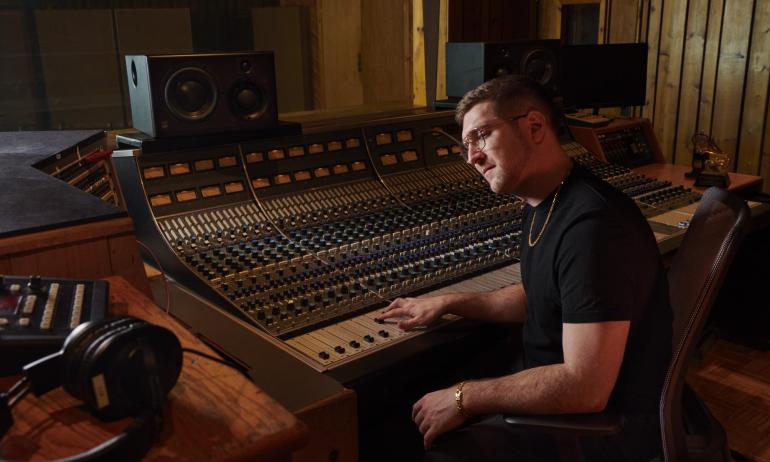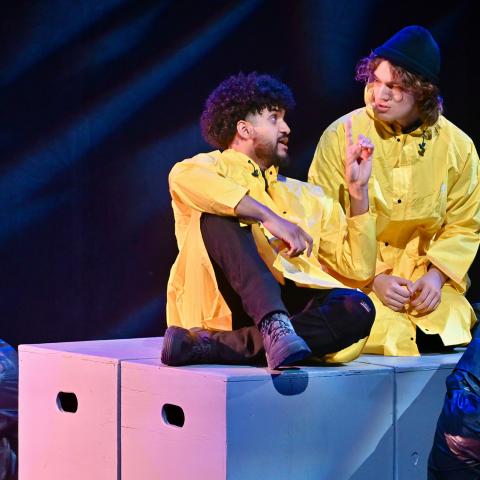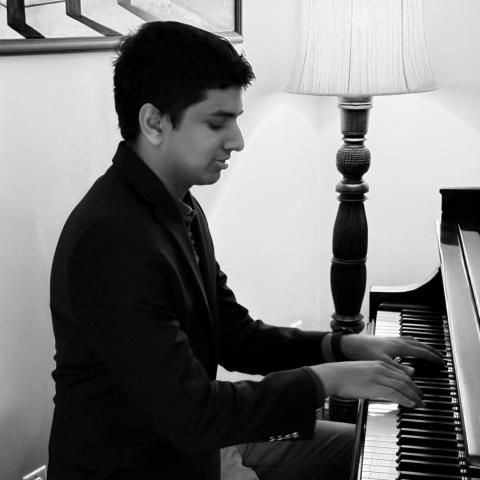Get to Know Rodney Alejandro, the New Chair of the Songwriting Department

Image by Peter Neill
Rodney Alejandro brings an incredibly diverse range of skills and experiences to his new role as chair of the Songwriting Department. Musically, his credits range genres from Mexican regional music to classic rock and include performances with will.i.am, Stevie Wonder, and Paulina Rubio. As a composer and producer, he's created themes for TV shows such as The Shield and the Spanish-language version of The Ellen Degeneres Show. All of this varied experience informs Alejandro’s approach to guiding songwriting students toward sustainable careers in the music industry. "Today the industry has so many avenues of access, and it is important more than ever to have a skill set that is diversified, agile, and innovative in order to attain one’s success," he said. "I am grateful to have had such an experience I can share firsthand with our songwriting majors."
In the following interview, learn more about Alejandro's musical background, his plans for the Songwriting Department, and the music that inspires him.
You’ve worked in many genres, from R&B and regional Mexican to rock and pop, and have musical credits on major TV programs—could you describe how you approach a project?
My approach, regardless of music or medium, is to serve what is most important to the audience the project is for. For making records, the song and artist are the focus. Everything revolves around the melody, lyric, and artist performance. For TV, the story line and visuals of the show are the focus. Everything revolves around themes and how the show is presented.
Could you talk about an experience that sticks out to you as important?
My first big win as a main title composer taught me the importance of believing in myself and not following the rules. After being told I was ineligible to submit any work for a TV pilot, I did anyway. After all, I had nothing to lose. Yet by trusting my talent, I submitted and won the main title placement. The private screening was for a show called The Shield. As I watched the show, a phrase popped into my head: "just another day." On the drive home, I composed a rock riff for guitar and began thinking about the production having a gritty inner city feel with street ambience and some Latin sounds. Then I placed in the phrase and was singing the parts all the way home. When I arrived home, I jumped straight into the studio to produce a demo, got some friends to help, and then submitted. Oh and the music could only be 11 seconds long. There were 72 entries, and my music won the placement. Lessons learned: trust my talent, take chances, and follow through.
Our department’s focus is to serve the varying career paths our majors can take.... The demands of future songwriters will be more than words and notes.
Rodney Alejandro
How has your diverse level of experience come into your classrooms over the years? And how might it affect your style of leadership as the chair?
My career spanned some of the most challenging years of the music industry as a whole. During those years, music creators had to diversify, be agile, and be innovative as to how to thrive in the changing landscape of the music business. Today the industry has so many avenues of access, and it is important more than ever to have a skill set that is diversified, agile, and innovative in order to attain one’s success. I am grateful to have had such an experience I can share firsthand with our songwriting majors.
In your role as chair, what are you looking forward the most to?
High on my list is curriculum development to expand on the great offerings the Songwriting Department already has. As the music business evolves, so must our course offerings, which are led by faculty who have lived the experience of being music makers. We also are developing events that bring students closer to the industry, such as writer camps for publishers and labels.
What do you think sets the Berklee songwriting program apart? How does it prepare songwriters for careers in the music industry, both as it is now, and where it might be headed in the future?
Songwriting in the music industry is more than just crafting. It is also music performance, music production, and understanding the business. Songwriting is about content creation, collaboration, and community. Our department’s focus is to serve the varying career paths our majors can take, such as being a songwriter/topliner, a songwriter/performer, a songwriter/producer, or being a musical theater songwriter. The demands of future songwriters will be more than words and notes.
What are you currently listening to that you think is really doing something well or new?
I have been listening to amapiano* music from South Africa. Something about the bass lines, electronic elements, atmospheres, vocals, and harmonies all create this hypnotizing, infectious groove.
*Amapiano is a South African style of dance music that draws on genres such as house, jazz, and lounge. To get an idea of the genre, listen to this playlist curated by Spotify:
Is there a particular song (or songs) that made you want to be a songwriter? If so, any reflections as to why, or what about that song moved you in that way?
Any song that moved me emotionally made me want to write. I mean, [things like] torch songs of Mariachi to funk-driven pop by Prince. I just wanted to make people move in some way.
What artist or album do you go back to when you need to refresh your creativity?
I tend to no not go back to refresh creativity. When I need that inspiration I look to what is emerging in any part of the world. Music is global now, so when a genre/style crosses over there is much to be inspired by.




